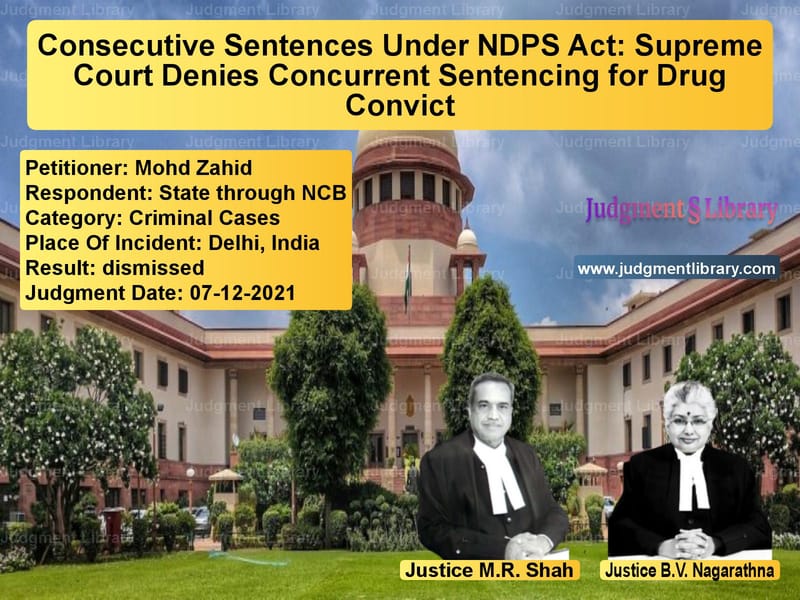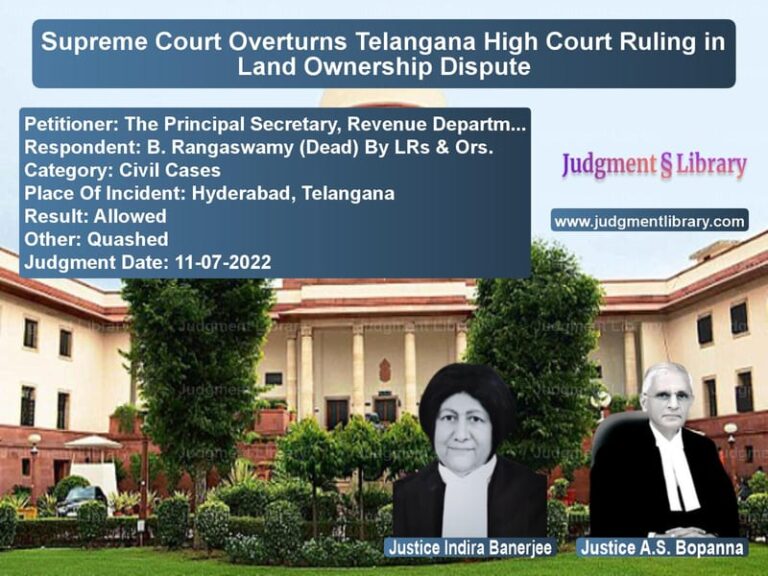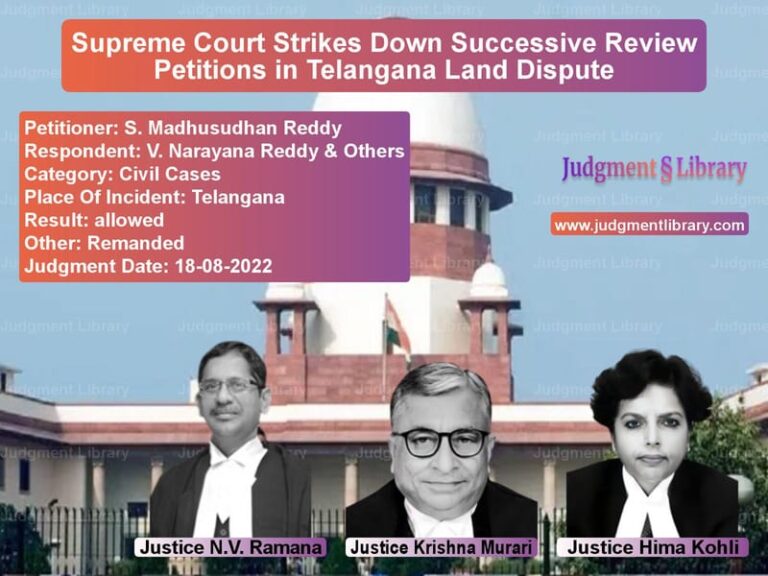Consecutive Sentences Under NDPS Act: Supreme Court Denies Concurrent Sentencing for Drug Convict
The Supreme Court of India recently ruled in the case of Mohd Zahid vs. State through NCB, addressing whether sentences imposed in separate trials for narcotics offenses should run concurrently or consecutively. The Court upheld the High Court’s ruling that the petitioner must serve his sentences consecutively, citing the gravity of narcotic drug offenses under the Narcotic Drugs and Psychotropic Substances Act, 1985 (NDPS Act).
Background of the Case
The case involved the appellant Mohd Zahid, a Pakistani national who was convicted in two separate cases of drug trafficking:
- In FIR No.134/1999 at Amritsar, he was sentenced to 12 years of rigorous imprisonment (RI) for possession of 4 kg of heroin.
- In FIR No.43/1999 at New Delhi, he was convicted for possession of 750 grams of heroin and sentenced to 15 years RI, with an additional fine under Section 31(ii) of the NDPS Act due to a prior conviction.
Since no specific order was passed on whether the sentences would run concurrently, the appellant approached the High Court, arguing that both sentences should run concurrently under Section 427 of the Criminal Procedure Code (Cr.P.C.). The High Court dismissed his appeal, leading him to approach the Supreme Court.
Petitioner’s Arguments
The appellant argued:
- He had already spent nearly 22 years in prison, as he was arrested in 1999.
- His conduct in jail had been good, and no adverse remarks had been made against him.
- Under Section 427(1) of Cr.P.C., if an offender is serving one sentence and is later convicted in another trial, the court has the discretion to allow sentences to run concurrently.
- Given that he had already served 12 years in the Amritsar case, his 15-year sentence in the Delhi case should be adjusted to run concurrently.
- He was a foreign national, and serving a total of 27 years in prison was disproportionate.
Respondent’s Arguments
The prosecution, represented by the Narcotics Control Bureau (NCB), opposed the appeal, arguing:
- The appellant was convicted in two separate transactions involving drug trafficking.
- The law presumes that in separate trials, sentences should run consecutively, unless the court explicitly directs otherwise.
- There was no order from the sentencing courts directing concurrent sentences.
- Drug trafficking is a serious offense, and leniency should not be granted to repeat offenders.
- The principle of concurrent sentencing does not apply to habitual offenders who commit crimes on different occasions.
Supreme Court’s Observations
The Court analyzed whether Section 427 of Cr.P.C. applied in this case and whether the sentences should run concurrently or consecutively.
1. Section 427 of Cr.P.C. and Consecutive Sentences
The Court clarified the application of Section 427, which states:
“When a person already undergoing a sentence of imprisonment is sentenced on a subsequent conviction, such imprisonment shall commence at the expiration of the imprisonment to which he has been previously sentenced, unless the Court directs that the subsequent sentence shall run concurrently.”
The Court ruled that in the absence of an explicit direction, the sentences must run consecutively.
2. Different Transactions Require Consecutive Sentences
The Court referred to previous rulings and held:
“Where there are different transactions, different crime numbers, and the cases have been decided by different judgments, concurrent sentencing cannot be awarded under Section 427 of Cr.P.C.”
Since the two drug cases were separate incidents, they could not be merged for concurrent sentencing.
3. Enhanced Sentence for Repeat Offenders Under NDPS Act
The Court noted that Section 31(ii) of the NDPS Act prescribes enhanced punishment for repeat offenders. Since the appellant had a prior conviction, the law required a harsher sentence in the second case.
“No leniency should be shown to an accused found guilty of indulging in illegal drug trafficking.”
4. Drug Trafficking’s Impact on Society
The Court made strong remarks on drug trafficking:
“Those who deal in narcotic drugs are instruments in causing death or inflicting deadly blows to many young victims. Such offenders pose a hazard to society and must be dealt with sternly.”
It rejected the plea for leniency, stating that drug-related crimes have a devastating social impact.
Supreme Court’s Verdict
The Supreme Court ruled:
- Dismissed the appeal, affirming that the appellant’s sentences would run consecutively.
- Held that concurrent sentencing was not applicable due to the separate nature of the offenses.
- Emphasized the need for strict punishment in narcotics cases.
Implications of the Judgment
This ruling has significant implications for sentencing under the NDPS Act:
- Precedent for Consecutive Sentencing: Courts must order concurrent sentences explicitly; otherwise, separate convictions will result in consecutive terms.
- Harsher Punishment for Repeat Offenders: The ruling affirms that enhanced sentences under Section 31(ii) of the NDPS Act must be imposed on second-time offenders.
- Drug Crimes Taken Seriously: The judgment reinforces a strict stance against narcotics-related offenses.
- Guidance for Trial Courts: Trial courts must clearly state whether sentences should run concurrently to avoid future litigation.
This case reinforces India’s stringent anti-drug policies and the principle that repeat offenders will not be granted leniency under criminal law.
Petitioner Name: Mohd Zahid.Respondent Name: State through NCB.Judgment By: Justice M.R. Shah, Justice B.V. Nagarathna.Place Of Incident: Delhi, India.Judgment Date: 07-12-2021.
Don’t miss out on the full details! Download the complete judgment in PDF format below and gain valuable insights instantly!
Download Judgment: mohd-zahid-vs-state-through-ncb-supreme-court-of-india-judgment-dated-07-12-2021.pdf
Directly Download Judgment: Directly download this Judgment
See all petitions in Drug Possession Cases
See all petitions in Bail and Anticipatory Bail
See all petitions in Judgment by Mukeshkumar Rasikbhai Shah
See all petitions in Judgment by B.V. Nagarathna
See all petitions in dismissed
See all petitions in supreme court of India judgments December 2021
See all petitions in 2021 judgments
See all posts in Criminal Cases Category
See all allowed petitions in Criminal Cases Category
See all Dismissed petitions in Criminal Cases Category
See all partially allowed petitions in Criminal Cases Category







